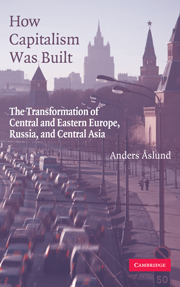Book contents
- Frontmatter
- Contents
- List of Tables and Figures
- List of Abbreviations
- Acknowledgments
- Introduction: A World Transformed
- 1 Communism and Its Demise
- 2 Shock Therapy versus Gradualism
- 3 Output: Slump and Recovery
- 4 Liberalization: The Creation of a Market Economy
- 5 From Hyperinflation to Financial Stability
- 6 Privatization: The Establishment of Private Property Rights
- 7 An Inefficient Social System
- 8 Democracy versus Authoritarianism
- 9 From Crime toward Law
- 10 The Role of Oligarchs
- 11 The Impact of the Outside World
- Conclusions: A World Transformed
- Bibliography
- Index
10 - The Role of Oligarchs
Published online by Cambridge University Press: 05 September 2012
- Frontmatter
- Contents
- List of Tables and Figures
- List of Abbreviations
- Acknowledgments
- Introduction: A World Transformed
- 1 Communism and Its Demise
- 2 Shock Therapy versus Gradualism
- 3 Output: Slump and Recovery
- 4 Liberalization: The Creation of a Market Economy
- 5 From Hyperinflation to Financial Stability
- 6 Privatization: The Establishment of Private Property Rights
- 7 An Inefficient Social System
- 8 Democracy versus Authoritarianism
- 9 From Crime toward Law
- 10 The Role of Oligarchs
- 11 The Impact of the Outside World
- Conclusions: A World Transformed
- Bibliography
- Index
Summary
Suddenly, the Russian steel industry has become a hot topic in the international business community. A few years ago, this would have seemed a crazy notion. During the Soviet era the Russian steel industry was ridiculed for its obsession with planning targets and was a byword for inefficiency. But since the break-up of the Soviet Union, a series of large and powerful steel companies has been created from the privatization of previously government-owned steel operations in Russia.
Financial Times, June 14, 2006Nothing is as controversial as “oligarchs.” The opening quote marvels over how Russian oligarchs have transformed the Russian steel industry, but as if to avoid praising them, the word “oligarch” is avoided (Marsh 2006). “Oligarch” is an ancient concept, and an “oligarchy” is defined as “government in the hands of a few” by the Oxford University Press Dictionary. In that sense of the word, the semidemocratic countries in the former Soviet Union may be described as oligarchic.
In Russia and Ukraine, “oligarch” became a popular label for the wealthiest tycoons around 1994, as the first truly rich people emerged. The meaning of oligarch in the two countries is similar. An “oligarch” is a very wealthy and politically well-connected businessperson, a dollar billionaire, or nearly so, who is the main owner of a conglomerate of enterprises and has close ties to the president. Oligarchs or robber barons are few and tremendously wealthy.
- Type
- Chapter
- Information
- How Capitalism Was BuiltThe Transformation of Central and Eastern Europe, Russia, and Central Asia, pp. 256 - 280Publisher: Cambridge University PressPrint publication year: 2007



